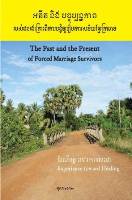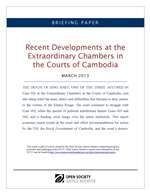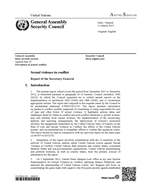In the ECCC Court Report of April 2013 the Office of the Co-Investigating Judges (OCIJ) announced that their Investigation Unit incorporated Ms. Julie Plante as new investigator specialized in gender-based violence.
Download the Court Report here.
In the ECCC Court Report of April 2013 the Office of the Co-Investigating Judges (OCIJ) announced that their Investigation Unit incorporated Ms. Julie Plante as new investigator specialized in gender-based violence.
Download the Court Report here.
In their Decision on Severance of Case 002 following Surpreme Court Chamber Decision of 8 February 2013 issued on 26 April 2013, the Trial Chamber of the ECCC rules that forced marriage charges will not be included in the first sub-trial of Case 002/01 for the following reasons:
“Inclusion of offences concerning forced marriage and rape in addition confront particular issues, some of which stem from their manner of incorporation into the Case 002 Closing Order, which binds the Trial Chamber. Their inclusion also remains subject to the resolution of various legal challenges concerning the exact nature of the crimes alleged.” (Paragraph 160, p.69)
In the Tentative Plan for Future Trial of the Remaining Portions of Case 002 which is annexed to the decision, the Trial Chambers lists the charges of forced marriages under Case 002/03, the third and final sub-trial. However, in the decision the Chamber emphasizes that such “… a timetable for future trials could be based only on unknown contigencies, outside the control of the Trial Chamber, such as the continued fitness of the Accused to be tried and the continuity of donor support to the ECCC” (Paragraph 153, p. 65).
Downloead the full decision here.

Published in April 2013
From June 2011 to June 2012, CDP set up and ran the first self-help group for forced marriage survivors under the guidance of psychologist Ms. Yim Sotheary. The publication “The Past and the Present of Forced Marriage Survivors – Experience Towards Healing”, authored by Ms. Yim, documents this intervention and its impact on the women who participated in the group.
Go to Publications and Materials to download the full publication.

Published in March 2013
Open Society Justice Initiative (OSJI) publishes regular briefing papers examining progress, priorities, and challenges at the ECCC. In their recent issue under the title “Recent Developments at the Extraordinary Chambers in the Courts of Cambodia”, OSJI recommends to the Co-Investigating Judges to consider including gender-based violence committed during the Khmer Rouge period in the investigation and any proposed indictment in Cases 003 and 004.

Published by UN General Assembly Security Council on 14 March 2013
In his Annual Report on Sexual Violence in Conflict for the period of December 2011 to December 2012, UN Secretary-General Ban Ki-moon reports on the implementation of UN Security Council Resolutions 1820 and 1888 in Cambodia and recommends appropriate actions as follows (para. 114):
“In Cambodia, crimes of sexual violence, with the exception of forced marriage, have not been taken up by the Extraordinary Chambers in the Courts of Cambodia, a Cambodia-United Nations hybrid tribunal established under Cambodian law in 2004 to bring to justice senior leaders and those most responsible for atrocities committed between 17 April 1975 and 6 January 1979. Nor have sexual crimes been integrated into the forensic, investigative or prosecutorial strategies of the Extraordinary Chambers. According to the Extraordinary Chambers, the possibility of expanding the scope of charges against the accused to crimes beyond those in the indictment is precluded by its legal framework. In December 2011, a hearing on sexual violence under the Khmer Rouge regime revealed that sexual violence was a daily reality for most women, that acts of sexual violence were seldom punished and implicitly endorsed by an “enemy policy” promulgated by leaders at the highest levels and that survivors continue to suffer from trauma, discrimination and stigma. I reiterate the call made by my former Special Representative for the Government to ensure the rigorous documentation of such crimes for the historical record and for the Extraordinary Chambers to establish mechanisms for the appropriate recognition of and reparations for victims of sexual violence, as well as the effective prosecution of perpetrators of crimes of sexual violence and forced marriage.“